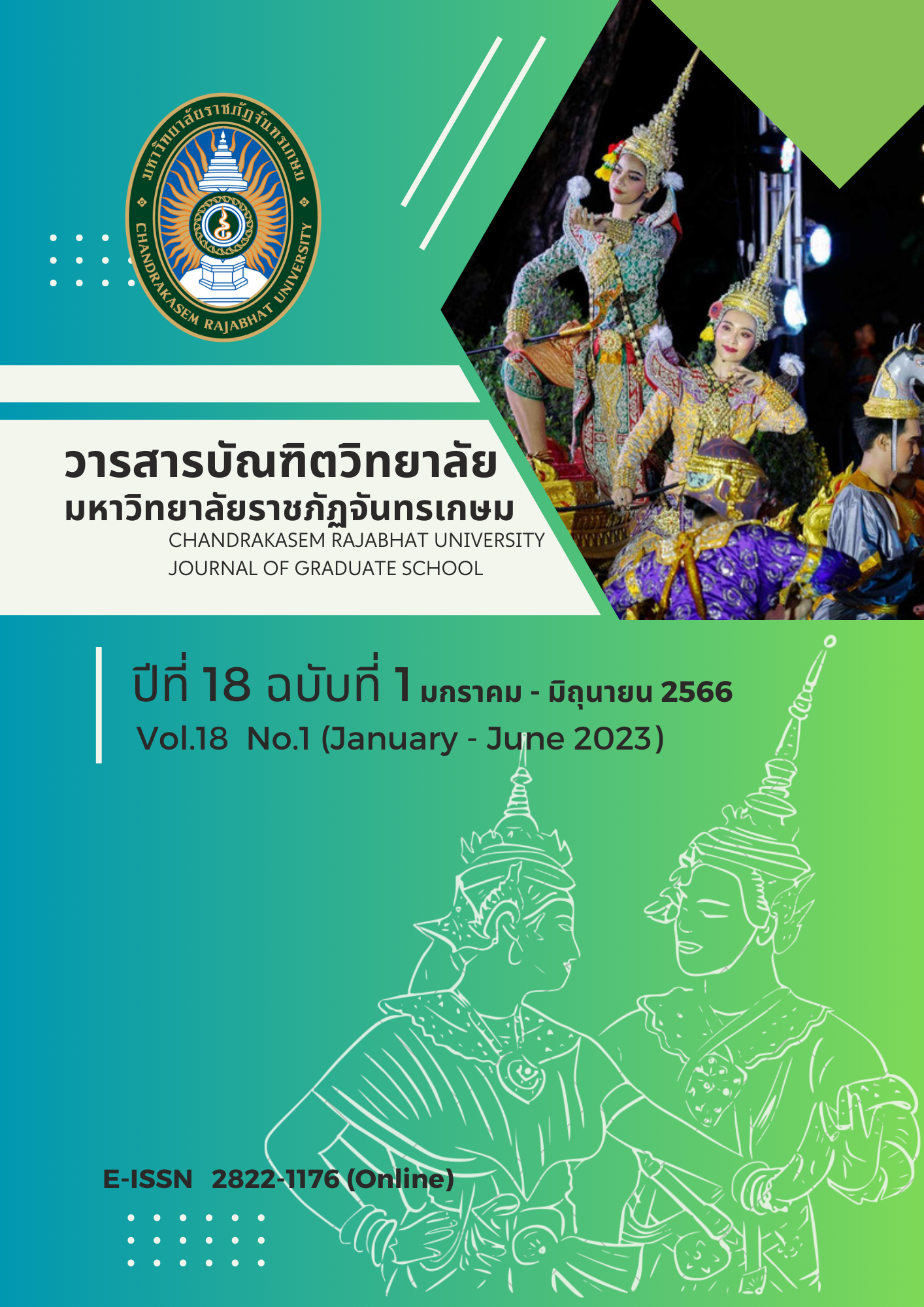การพัฒนาความสามารถทางการพูดภาษาอังกฤษของนักศึกษา มหาวิทยาลัยราชภัฏจันเกษมด้วยกลวิธีการเรียนแบบเสริมต่อการเรียนรู้ ผ่านโครงงานภาษาอังกฤษ
Main Article Content
บทคัดย่อ
งานวิจัยนี้ มีวัตถุประสงค์ (1) เพื่อเปรียบเทียบความสามารถทางการพูดภาษาอังกฤษก่อนและหลังเรียนการจัดการเรียนรู้ด้วยกลวิธีเสริมต่อการเรียนรู้ผ่านการทำโครงงานภาษาอังกฤษ (2) เพื่อศึกษาความพึงพอใจของนักศึกษาที่มีต่อการจัดการเรียนรู้ด้วยกลวิธีการเสริมต่อการเรียนรู้ผ่านการทำโครงงานภาษาอังกฤษ กลุ่มตัวอย่าง คือ นักศึกษาที่ลงทะเบียนเรียนรายวิชา GELE1002 English for Work (ภาษาอังกฤษปฏิบัติงาน) จำนวน 115 คน ซึ่งได้มาจากการเลือกแบบเจาะจง(Purposive Sampling) โดยแบ่งเป็นกลุ่มจำนวน 13 กลุ่ม กลุ่มละ 9 คน จำนวน 11 กลุ่ม กลุ่มละ 8 คน จำนวน 2 กลุ่ม เครื่องมือที่ใช้ในการวิจัย ประกอบด้วย 1) แบบทดสอบการพูดที่ใช้ประเมินก่อนและหลังเรียน 2) แผนการจัดการเรียนรู้ด้วยกลวิธีเสริมต่อการเรียนรู้ 3) เกณฑ์การวัดความสามารถทางการพูดภาษาอังกฤษ 4) แบบวัดประสิทธิภาพของการจัดทำโครงงาน 5 ) แบบสอบถามความพึงพอใจต่อการจัดการเรียนรู้ด้วยกลวิธีการเสริมต่อการเรียนรู้ผ่านการทำโครงงานภาษาอังกฤษ ค่าสถิติที่ใช้ในการวิเคราะห์ข้อมูล ได้แก่ ค่าเฉลี่ย ค่าส่วนเบี่ยงเบนมาตรฐาน และค่า t-test ชนิด dependent sample
ผลการวิจัยพบว่า (1) ความสามารถทางการพูดภาษาอังกฤษของกลุ่มตัวอย่างหลังได้รับการจัดการเรียนรู้ ด้วยกลวิธีเสริมต่อการเรียนรู้ผ่านการทำโครงงานมีคะแนนสูงกว่าก่อนเรียนอย่างมีนัยสำคัญที่ระดับ 0.05 (2) ผลการสำรวจความพึงพอใจของผู้เรียนที่มีต่อการจัดการเรียนรู้ด้วยการเสริมต่อการเรียนรู้ ผ่านการทำโครงงานภาษาอังกฤษมีค่าเฉลี่ยอยู่ในระดับมากโดยมีค่าเฉลี่ยเท่ากับ 3.91 และค่าส่วนเบี่ยงเบนมาตรฐานเท่ากับ 0.64
Article Details

อนุญาตภายใต้เงื่อนไข Creative Commons Attribution-NonCommercial-NoDerivatives 4.0 International License.
เอกสารอ้างอิง
วิจารณ์ พานิช. (2555). วิธีสร้างการเรียนรู้เพื่อศิษย์ในศตวรรษที่ 21. กรุงเทพฯ : มูลนิธิสดศรี- สฤษดิ์วงศ์.
สุเนตร สืบค้า. (2561). บทเรียนแห่งการเรียนรู้ เรื่อง เทคนิคและวิธีการสอนรูปแบบ Scaffolding. สืบค้นจาก http://www,erp.mju.ac.th.
สุรางค์ โค้วตระกูล. (2553). จิตวิทยาการศึกษา (พิมพ์ครั้งที่ 9). กรุงเทพฯ: จุฬาลงกรณ์ มหาวิทยาลัย.
สมบัติ คชสิทธิ์, จันทนี อินทรสูต และธนกร สุวรรณพฤฒิ. (2560). การจัด การเรียนรู้ภาษาอังกฤษให้กับผู้เรียนยุค THAILAND 4.0. วารสารวไลอลงกรณ์ปริทัศน์ (มนุษยศาสตร์และสังคมศาสตร์), 5(2) : 75-185.
Atipat Boonmooh, & Thidaporn Jumpakate. (2019). Using Scaffolded Instructions to Improve Students’Skills. Reflections. 26(1) : 1-16.
Daniels, D. (2002). Metacognition and reflection. Retrieved from http://dennisgdaniels.com.
Darni Maulany. (2012). The Use of Project-based Learning in Improving the Students. Speaking Skill Journal of English and Education 2013, 1(1) : 30-42.
Dixon-Krauss, L. (1996). Vygotsky in The Classroom : Mediated Literacy Instruction and Assessment. Now York : Longman.
Fried - Booth. Diana L. (1987). Project work. Great Britain : Oxford University Press.
Hamilton R. and Ghatala E. (1994). Learning and Instruction. New York : McGrow-Hill.
Jackie A Wals. (2019). How scaffold skills for Students Discussions. Retrieved from https://learn.canvas.net/urses /1147/pages/scaffolding-discussion-skills.
Kashen. S.D. (1982). Designing tasks for the communicative classroom. Glass grow : Bell & Bain Ltd.
Katz, L.G. and S.C. Chard. (1989). Engaging children’s mind: The project approach. New Jersey : Ablex.
Lamhot Naibaho. (2019). “The effectiveness of Scaffolding Method on Students’ Speaking Achievement”.
International Journal of Research-Granthaalayah A knowledge respository, 7(5): 193-201.
Lipscomb, L., Swanson, J., West, A., (2009). "Scaffolding." In Emerging Perspectives on Learning,
Teaching, and Technology. by M. Orey. Retrieved from http://projects.coe.uga.edu/epltt/.
Mohr, K. J. and Mohr, E. S. (2007). “Extending English-Language Learners classroom Interaction using the response Protocol”. Reading Teacher, 60(5) : 440-450.
Maria Conca. (2019). All about PBL :How to Learn a Language through Projects. Retrieved from https://ihworld.com/ih-journal/ih-journal-blog/all-about-pbl-how-to-learn-a-languag through-projects/
Wing, J., and Putney, L. G. (2002). A vision of Vygotsky. Boston : Pearson.
Vygotsky’s Sociocultural Theory (1978). Vygotsky in The Classroom : Mediated Literacy Instruction and Assessment. Now York : Longman.
Vygotsky. L.S. (1978). Mind in society : The development of higher psychological processes. Cambridge, MA.: Harvard University Press.
Young, M.W. (1996). English (as a second) language arts teachers : The key to mainstreamed ESL student success. English Journal, 85(8) : 17.


